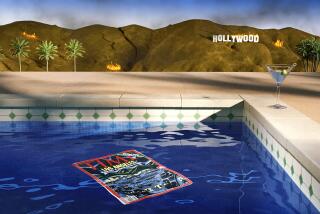City, Religious Leaders Move to Calm Residents
- Share via
Acknowledging a collective sense of anxiety that has settled over the city, community and religious leaders are taking to the streets and airwaves to calm jittery nerves and urge restraint, regardless of the outcome in the federal trial of four Los Angeles police officers charged with violating Rodney G. King’s civil rights.
As the trial entered its final phase this week, businesses and local government braced for worst-case scenarios and police prepared with massive deployment plans. But community activists urged residents to respond nonviolently to the verdict.
“More violence will just hurt our community even more,” said Oscar Andrade, executive director of El Rescate, an advocacy group serving Central American immigrants in the Pico-Union district, which was heavily damaged in last year’s riots.
The activists called on lawmakers to address the poverty and social inequities that they view as the driving forces behind last year’s devastating civil unrest.
“The root causes of last year’s disturbances continue to exist,” said Andrade, who cited the high unemployment, homelessness and poverty of many inner-city residents.
Immigrant advocates also said they were concerned about excessive police reaction--particularly if U.S. immigration agents are deployed, as they were during last year’s unrest. More than 1,000 immigrants were returned to their homelands after being arrested during the riots.
Across town on the grounds of the Watts Towers, the architectural landmark of a neighborhood best known as the site of the bloody 1965 riots, elected officials also sounded a call for unity among city residents.
“We want to be sure there’s not a division on the street between the black and Latino communities,” said state Sen. Diane Watson (D-Los Angeles), whose Crenshaw Boulevard office will serve as a temporary emergency assistance center.
Assemblyman Richard G. Polanco (D-Los Angeles) echoed Watson’s call for nonviolence.
“Our city can’t afford the violence we saw last year,” Polanco said. “We can’t afford it financially, and we certainly can’t afford it socially. We’re asking everyone to stop and remember that we are all one people, living together, working together, sharing one city.”
Cardinal Roger M. Mahony, in a dramatic Good Friday sermon at St. Vibiana’s Cathedral in downtown Los Angeles, compared the mood of the city to that of Jerusalem during the crucifixion of Christ about 2,000 years ago.
“Those same kinds of fears and anxieties are in our hearts and in our citizens, in our homes, on the streets, in our office buildings, truly everywhere, because this year, the federal court trial coincides with the holy days,” Mahony said.
“Los Angeles has suffered and died on its cross once,” he said in cautioning his congregants against violence. “It is not necessary for our city to die again.”
Meanwhile, a consortium of 40 Asian-American organizations announced plans to kick off a campaign to inject reason and calm into Los Angeles’ diverse Asian-American communities.
“We don’t want people to panic and start using weapons,” said Stewart Kwoh, who organized Asian Pacific Americans for a New L.A. after last year’s riots. “We want the people to utilize our information network.”
The coalition’s campaign will include an informational phone network, weekly meetings with representatives of Asian news media and weekly bulletins to Asian Pacific American organizations.
Kwoh said that at a time when many Asian-Americans have little faith in the Los Angeles Police Department, it is doubly important that the community know about the preparations the department has made.
Korean-language radio programs also urged their listeners to remain calm.
“Law enforcement authorities have told us they are prepared for any contingency,” Sung-Soo Kim told his audience Friday morning on his show, “Good Morning, America,” on KCB-FM radio. “It’s good to prepare for what could happen, but we must not get swept up in all this mainstream media hype and overreact.”
Many stressed changes made in the last year that leave the city better prepared for any contingency after the verdicts. Watson expressed confidence that Police Chief Willie L. Williams, who took office after last year’s disturbances, had taken precautions in the event of trouble.
“Chief Williams feels people should be able to demonstrate and vent, as long as they’re within the law,” said Watson, who added that she was not fearful of a police overreaction--a concern among some community leaders.
“I don’t think you’ll see an overreaction,” Watson said. “I think you’ll see a reaction and a response.”
Rabbi Allen Freehling of University Synagogue in Westwood said he hoped that the city had learned its lessons from a year ago.
“If we believe ours is a nation of laws, then we have to depend upon the efficacy of jury trials,” he said. “We cannot take to the streets every time and any time we are disappointed . . . by a court decision.”
A coalition of African-American churches called on religious institutions to be “havens of relief, support, prayer and peace for all people,” said Oscar Owens, staff chairman of the Los Angeles Ecumenical Congress.
In Watts, some residents said the anticipated police response would make mass disturbances unlikely.
“I think the police are going to be ready this time,” said Reginald McClenton, a security guard who was having lunch on the steps of his residence across from the Watts Towers. “The community is just numb.”
Times staff writer K. Connie Kang contributed to this story.
* TROOP MOVEMENT: Gov. Wilson orders 600 Guard troops to armories in advance of Rodney King verdicts. A25
More to Read
Sign up for Essential California
The most important California stories and recommendations in your inbox every morning.
You may occasionally receive promotional content from the Los Angeles Times.













